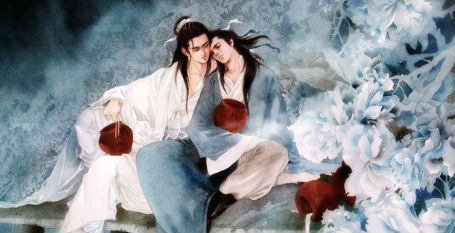China's hugely popular male gay erotic stories are written mostly by women who project their wish for emancipation on gay community, say social analysts.
‘‘I think Chinese culture is still harsh on women in terms of how far they can go in developing a fantasy life or erotic art forms,’’ Katrien Jacobs, a Chinese researcher told sinosphere.blogs.nytimes.com. ‘‘I think they have to be very careful in coming out with their fantasies.’’
So those fantasies, safely projected onto ‘‘other,’’ gay, male bodies, represent a revolt against a deeply conservative culture, which expects passivity and childlikeness from women, said the sexual culture specialist at the Chinese University of Hong Kong.
Creating and consuming “danmei” is a way for women to explore their long-repressed sexuality, said Jacobs.
Slash fiction or “danmei” is particularly popular on the Chinese web. It is a Japanese cultural import where it is called “yaoi” and took off there in the early 1980s.
No question, “danmei,” or ‘‘indulge in beauty,’’ the erotic stories and manga have put down deep roots in China, she said.
It is characterized by underground, gay-themed novels, short stories and comics, mostly distributed online.
“Danmei” almost always involves sexual relations, often between celebrities, politicians, sports figures, actors and film characters, with key themes including humiliation of powerful men in gay relationships, father-son incest, even superheroes having sex.
It so popular in China that websites where people post their writings and drawings record millions of page views a day and millions of members.
In China it is ‘‘roaring,” said Jacobs. One Chinese website, Jinjiang Literature City, has about five million members although she estimates it at about two million views a day.
“Danmei” is part of an ‘‘ongoing sexual revolution’’ with feminist characteristics in China, a Chinese academic who requested anonymity told sinosphere.blogs.nytimes.com.
One popular subgenre of father-son incest is a reversal of the usual narrative where the son controls the father and is a veiled call for social and political change, the Chinese researcher said.
In Confucian culture, the relationship between father and son mirrors that of ruler and servant, so subvert the father and you subvert the state.
‘‘Young people really want to change this relationship of dominance,’’ Jacobs said. ‘‘It’s about sexual freedom and autonomy,’’ she said. ‘‘And that’s connected to other freedoms.’’
The National Office Against Pornographic and Illegal Publications has recently undertaken a crackdown on “danmei” describing it as online pornography.
Many Chinese fiction-sharing websites have since then removed their “danmei” collections while some websites dedicated to the genre have been shuttered completely.
‘‘I think Chinese culture is still harsh on women in terms of how far they can go in developing a fantasy life or erotic art forms,’’ Katrien Jacobs, a Chinese researcher told sinosphere.blogs.nytimes.com. ‘‘I think they have to be very careful in coming out with their fantasies.’’
So those fantasies, safely projected onto ‘‘other,’’ gay, male bodies, represent a revolt against a deeply conservative culture, which expects passivity and childlikeness from women, said the sexual culture specialist at the Chinese University of Hong Kong.
Creating and consuming “danmei” is a way for women to explore their long-repressed sexuality, said Jacobs.
Slash fiction or “danmei” is particularly popular on the Chinese web. It is a Japanese cultural import where it is called “yaoi” and took off there in the early 1980s.
No question, “danmei,” or ‘‘indulge in beauty,’’ the erotic stories and manga have put down deep roots in China, she said.
It is characterized by underground, gay-themed novels, short stories and comics, mostly distributed online.
“Danmei” almost always involves sexual relations, often between celebrities, politicians, sports figures, actors and film characters, with key themes including humiliation of powerful men in gay relationships, father-son incest, even superheroes having sex.
It so popular in China that websites where people post their writings and drawings record millions of page views a day and millions of members.
In China it is ‘‘roaring,” said Jacobs. One Chinese website, Jinjiang Literature City, has about five million members although she estimates it at about two million views a day.
“Danmei” is part of an ‘‘ongoing sexual revolution’’ with feminist characteristics in China, a Chinese academic who requested anonymity told sinosphere.blogs.nytimes.com.
One popular subgenre of father-son incest is a reversal of the usual narrative where the son controls the father and is a veiled call for social and political change, the Chinese researcher said.
In Confucian culture, the relationship between father and son mirrors that of ruler and servant, so subvert the father and you subvert the state.
‘‘Young people really want to change this relationship of dominance,’’ Jacobs said. ‘‘It’s about sexual freedom and autonomy,’’ she said. ‘‘And that’s connected to other freedoms.’’
The National Office Against Pornographic and Illegal Publications has recently undertaken a crackdown on “danmei” describing it as online pornography.
Many Chinese fiction-sharing websites have since then removed their “danmei” collections while some websites dedicated to the genre have been shuttered completely.












 列印版本
列印版本


















讀者回應
搶先發表第一個回應吧!
請先登入再使用此功能。